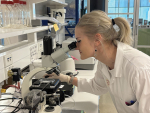Grape marc from New Zealand's wine industry is set to be transformed into high-value products in a $9.8 million project led by the University of Auckland.
The stems, skins and seeds left over from winemaking offer opportunities for food, paper, pharmaceutical, building and chemical products.
Professor Paul Kilmartin, an expert in wine chemistry, will lead the research programme, which has been awarded funding by the Ministry of Business, Innovation and Employment's Endeavour Fund.
Food additives, chemicals for specialised applications, and paper products with fire-retardant and antimicrobial properties are among potential uses.
"Our research team holds several patents and has developed leading-edge technological approaches that will be applied to grape marc components," the funding application reads.
As well as scientists from Waipapa Taumata Rau, University of Auckland, the team includes researchers from AUT, Crown research institute Scion and the University of Canterbury.
The programme will be "an example of how to create substantial new high-value product revenue streams for New Zealand companies while eliminating a primary industry waste stream as part of our future circular economy," says the application.
Paul's background in wine chemistry includes setting up the University's postgraduate Wine Science programme in 2003, which is now located at the Goldwater Wine Science Centre on Waiheke Island.












